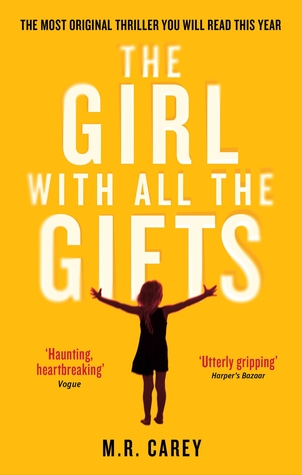Melanie loves school and learning and sums and especially her teacher Miss Justineau. Every morning in her cell, Melanie waits patiently as she is strapped into a wheelchair while Sergeant Parks keeps his gun pointed at her. She jokes that she won’t bite, but he doesn’t think she’s funny. Out of all the kids in the classroom, Dr. Caldwell calls Melanie “our little genius”, so Melanie wonders about all the things she’ll do when she grows up, which makes Miss Justineau sad.
In the first act, Melanie’s tragic situation is slowly and expertly revealed while maintaining tension and excitement through the readers’ ignorance, which is my favorite part of this book. The bulk of the story is pure thriller, which is fun but nothing special, but the ending is a good surprise that again takes advantage of Melanie’s unique perspective and the readers’ ignorance.
Melanie and the other children are instantly sympathetic, trapped in a world in which the adults give no answers despite their thoughtful curious nature. Unfortunately, the emotional drama is based on the idea that no one should hurt a child, that children are innocent, and they should be protected at all costs, which is not challenging.
Also not challenging are the adult characters, which include the sexy teacher with a moral compass, the hard-ass Sergeant who makes the plan and yells a lot, and the cold uncaring scientist who dissects children while they are still alive. It’s the last character that really irks me. Dr. Caldwell represents lazy characterization that unconsciously reinforces fear of science, which is doubly hypocritical in a supposed scifi story.
As this is a mashup of zombie thriller and “literary” post-apocalyptic fiction, I’d recommend this one as a popcorn action story for fans of kid heros.
“She’s lived in Plato’s cave, staring at the shadows on the wall. Now she’s been turned around to face the fire.”
